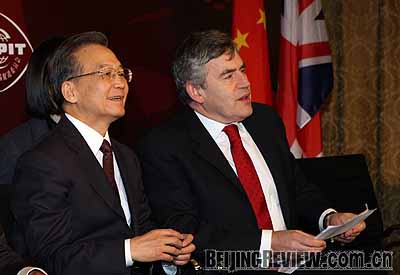| The British Foreign and Common-wealth Office (FCO) issued its first strategy document on relations with China on January 22. The document, entitled "The UK and China: A Framework for Engagement," has important implications for the development of the two countries' bilateral relations, as it charts the course for Britain's policy toward China for some time to come.
 |
|
TALKING BUSINESS: Chinese Premier Wen Jiabao attends the UK-China Business Summit in London on February 2 with British Prime Minister Gordon Brown (YAO DAWEI) | The document was issued at a time when the U.S.-triggered global financial crisis is deepening its effect on the world's real economy, resulting in the slowdown of most developed economies. Against this backdrop, it sends a clear signal that Britain is willing to seek cooperation around the world, especially with China, to jointly address the financial crisis, curb protectionism and create an international environment conducive to its own economic revival. In keeping with the Chinese Government's consistent commitment to openness, cooperation, mutual benefit, win-win results and building a harmonious world, China's Foreign Ministry responded positively to the FCO's strategy document.
Cashing in on China
Britain formulated the document based on its acknowledgement of China's rapid economic takeoff and the great vitality and potential of the Chinese economy. The FCO devoted an entire chapter of the document to explaining "why China matters." In his Foreword to the document, British Prime Minister Gordon Brown wrote, "The emergence of China as a global economic and political force is one of the most significant developments of our time." The first sentence of its Executive Summary reads, "China is already one of the world's top four economies, but we are probably still only in the early stages of its re-emergence."
Britain is one of China's most important trading partners in the European Union (EU). The two countries' bilateral trade volume underwent double-digit growth in 2008. Britain is the biggest investor in China of all EU countries. Thanks to the reform and opening up in the past three decades, China has made a remarkable economic leap forward as it integrates its own economy into the world economy. Despite the chilly economic climate last year, China maintained the momentum of economic development and opening up. Its huge financial input and favorable tax policies aimed at expanding domestic demand and stimulating the economy have filled people with confidence about economic recovery in 2009 and beyond. Fully aware of China's confidence about overcoming economic difficulties, Brown said in the Foreword that China is likely to present more opportunities for British businesses than any other country over the next decade.
Britain has a practical need to advance its relations with China and make China its partner in eliminating the specter of economic slowdown. As it spread beyond the United States last fall, the financial crisis dealt a heavy blow to the financial systems of European countries. Since London is one of the world's financial centers, Britain has suffered severely. In response, the Brown government took immediate actions to cope with the crisis. He also joined the EU's collective financial market rescue program. With these moves, Britain avoided a complete collapse of confidence among market participants and intermediaries. They also helped strengthen its financial system as it was tested to the extreme.
However, Britain's financial system is still fragile with a haunting confidence crisis. Like other EU economies, the British economy is experiencing a slowdown under the impact of the financial crisis on the real economy. The approval rating of the government has plummeted in the wake of rising unemployment and escalating social discontent, heightening the political pressure facing the ruling Labor Party.
To find a way out, the beleaguered British Government has to seek partners around the world. As one of the biggest emerging economies, China has large foreign exchange reserves and is able to implement flexible economic policies given its sound fiscal balance. It is bound to become an ideal partner for Britain. In fact, Britain became the biggest foreign investment destination of China in the EU in 2007.
|
